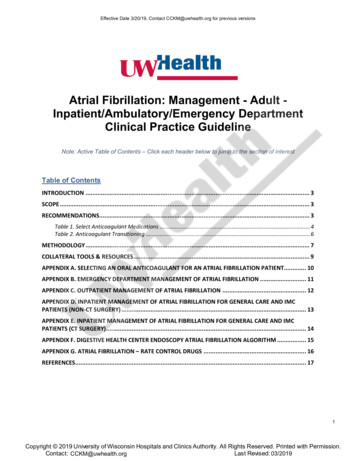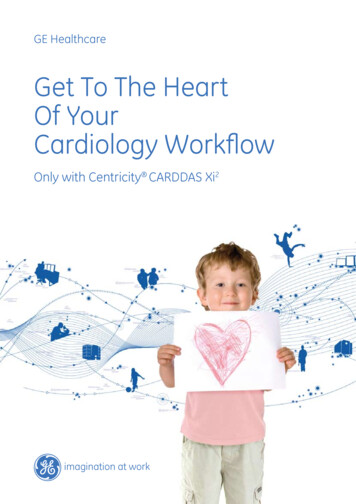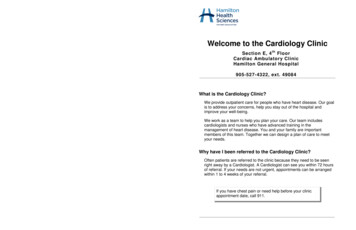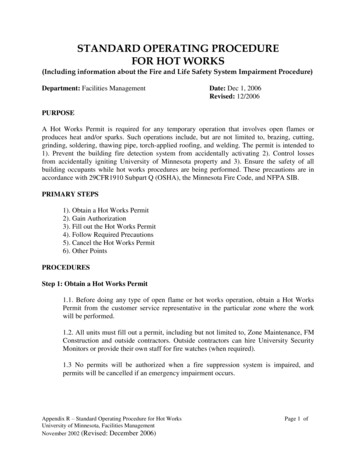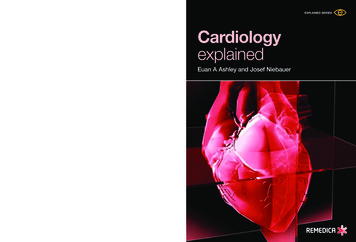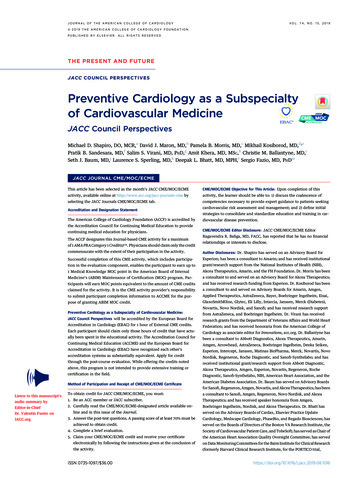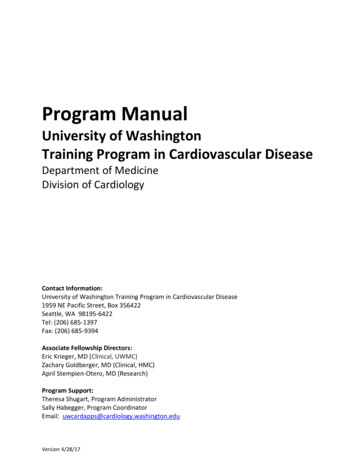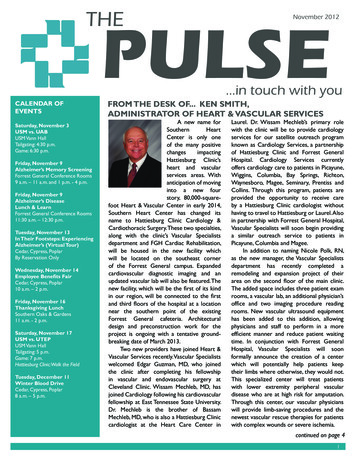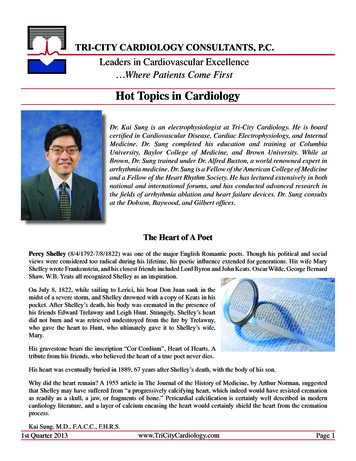
Transcription
Leaders in Cardiovascular Excellence Where Patients Come FirstHot Topics in CardiologyDr. Kai Sung is an electrophysiologist at Tri-City Cardiology. He is boardcertified in Cardiovascular Disease, Cardiac Electrophysiology, and InternalMedicine. Dr. Sung completed his education and training at ColumbiaUniversity, Baylor College of Medicine, and Brown University. While atBrown, Dr. Sung trained under Dr. Alfred Buxton, a world renowned expert inarrhythmia medicine. Dr. Sung is a Fellow of the American College of Medicineand a Fellow of the Heart Rhythm Society. He has lectured extensively in bothnational and international forums, and has conducted advanced research inthe fields of arrhythmia ablation and heart failure devices. Dr. Sung consultsat the Dobson, Baywood, and Gilbert offices.The Heart of A PoetPercy Shelley (8/4/1792-7/8/1822) was one of the major English Romantic poets. Though his political and socialviews were considered too radical during his lifetime, his poetic influence extended for generations. His wife MaryShelley wrote Frankenstein, and his closest friends included Lord Byron and John Keats. Oscar Wilde, George BernardShaw, W.B. Yeats all recognized Shelley as an inspiration.On July 8, 1822, while sailing to Lerici, his boat Don Juan sank in themidst of a severe storm, and Shelley drowned with a copy of Keats in hispocket. After Shelley’s death, his body was cremated in the presence ofhis friends Edward Trelawny and Leigh Hunt. Strangely, Shelley’s heartdid not burn and was retrieved undestroyed from the fire by Trelawny,who gave the heart to Hunt, who ultimately gave it to Shelley’s wife,Mary.His gravestone bears the inscription “Cor Cordium”, Heart of Hearts. Atribute from his friends, who believed the heart of a true poet never dies.His heart was eventually buried in 1889, 67 years after Shelley’s death, with the body of his son.Why did the heart remain? A 1955 article in The Journal of the History of Medicine, by Arthur Norman, suggestedthat Shelley may have suffered from “a progressively calcifying heart, which indeed would have resisted cremationas readily as a skull, a jaw, or fragments of bone.” Pericardial calcification is certainly well described in moderncardiology literature, and a layer of calcium encasing the heart would certainly shield the heart from the cremationprocess.Kai Sung, M.D., F.A.C.C., F.H.R.S.1st Quarter 2013www.TriCityCardiology.comPage 1
Dr. Berkowitz is currently chairman of the Department of Cardiology at BannerDesert Medical Center. He is board certified in Cardiovascular Disease,Vascular Medicine, Nuclear Cardiology, Interventional Cardiology, and InternalMedicine. He has advanced training from Columbia University and New YorkUniversity, and specializes in coronary and peripheral vascular disease diagnosisand management. He is one of the leading experts in the treatment of varicoseveins, and founded the Tri-City Cardiology varicose vein program. Dr. Berkowitzconsults at the Dobson, Baywood, and Gilbert offices.New Advances in Venous Disease Offers Patients Less Invasive Treatment SolutionsDo your legs ache, hurt, or swell by the end of the day?Do you have large painful varicose veins? These areall symptoms of venous disease. Approximately 30%of the US population, or 25 million people will developvenous insufficiency or “venous reflux disease.”Complications such as phlebitis (inflammation), bloodclots, infections, or ankle ulcers can occur in thosethat develop advanced venous disease. There are newoptions for treating this common disorder that offer anoutpatient, less invasive solution with quick recoveryand excellent results.Normally, the job of the veins is to bring blood back tothe heart and lungs. Healthy veins in the legs functionas one-way valves, keeping blood moving upwards inthe right direction. In people who develop venousdisease, the veins become “insufficient”, allowing blood to leak backwards away from the heart and pool in thelegs. The veins become congested causing aching, throbbing, heaviness, burning, and swelling. In advancedcases, this can progress to skin rashes, inflammation, infection, and ulceration.It is recommended that all patients with venous disease should be wearing compression stockings, participate inweight loss and exercise, and elevate the legs on a daily basis. There are now new procedures that can providea minimally invasive, simple, and effective treatment of this common condition. Radiofrequency ablation isa procedure performed in our office, with no general anesthesia, and no recovery time. A small catheter isintroduced through a small needle-stick into the diseased vein. The catheter delivers radiofrequency (heat)energy to the vein causing it to collapse and seal. This novel procedure causes no pain or bruising and essentiallyhas replaced previous surgical operations in the treatment of venous disease. The procedure is performed inusually less than one hour and the patient is able to resume normal activities immediately.If you have symptoms and suspect venous disease please talk with your doctor. The vascular specialists atTri-City Cardiology can provide a comprehensive assessment of venous disease and develop a patient-specifictreatment plan.M. Joshua Berkowitz, M.D., F.A.C.C., F.S.C.A.I., F.S.V.M.Page 2www.TriCityCardiology.com1st Quarter 2013
Dr. Kolli is an electrophysiologist at Tri-City Cardiology. He is board certifiedin Cardiovascular Disease and in Cardiac Electrophysiology. He trainedunder Dr. Alfred Buxton and Dr. Jose Jalife, both world-renowned expertsin arrhythmia disorders. Dr. Kolli was the winner of the Haffenreffer Award,which designated him as the best fellow of the year at Brown University. Hehas conducted cutting edge research projects at Brown University, JohnsHopkins University, and State University of New York. Dr. Kolli is a Fellow ofthe American College of Cardiology and a Fellow of the Heart Rhythm Society.Dr. Kolli consults at Baywood, Dobson, and Gilbert offices.Which blood thinner is right for me?Every 40 seconds someone in the US is diagnosed with a stroke. Every fourth minute someone dies of a stroke. AtrialFibrillation is one of the most common reasons for stroke worldwide. Stroke can occur both in patients who areintermittently in atrial fibrillation or always in it. It can occur at any point during the clinical course of the arrhythmia.Long term therapy with blood thinners is recommended in patients with atrial fibrillation to prevent the risk of stroke.The choice between treatment with aspirin and full blood thinners like Coumadin depends on several factors includingyour doctor’s assessment of risk, the ability to provide high quality monitoring of Coumadin, patient’s risk of bleeding,kidney function and patient preference like cost, convenience and dosing frequency.The risk of stroke in patients with atrial fibrillation is predicted using the CHADS2 score. The score is based on onepoint for Congestive Heart Failure, Hypertension, Age 75 yrs, Diabetes Mellitus and two points for Stroke. In patientswith no risk factors Aspirin 81mg is recommended. In patients with one point either Aspirin or full anticoagulation isrecommended. In patients with two points, full anticoagulation is recommended.Warfarin has been evaluated in numerous trials with thousands of patients and has been shown to significantly decreasethe risk of stroke by two thirds compared to no blood thinner treatment and decrease the risk of stroke by half comparedto treatment with aspirin. It is effective in all age groups of men and women including above 75 years. Being ablood thinner, it does increase the risk of bleeding. The goal is to thin the blood two to three times the norm. Thisrequires monitoring and follow up in the Coumadin clinic in either your cardiologist or primary doctor’s office. Inemergency situations of bleeding, the effect of Coumadin can be reversed using either vitamin K or fresh frozenplasma. Advantages include low cost, ability to be reversed in emergencies, and no need for special considerations inrenal failure. Disadvantages include the need for monitoring of INR, interactionswith several other drugs and dietary interactions.Over the past few years, there have been two new agents Dabigatran (Pradaxa)and Rivaroxaban (Xarelto) that have been approved in the US for anticoagulationin patients with atrial fibrillation. In research trials the full dose of Dabigatran hasbeen shown to have lower incidence of stroke and same incidence of bleeding.Xarelto has also been evaluated in comparison to Coumadin and has been shownto be noninferior to Coumadin. Advantages of these two newer medicationsinclude no requirement for INR monitoring and less susceptibility to dietary anddrug interactions. Disadvantages include higher cost, lack of antidote/reversing agent, and need for adjustment of dosewith change in renal function.This is a very important decision. Discuss in detail with your physician to make the decision regarding the best bloodthinner for you. Once initiated, it is very important to continue taking the medication regularly. These medicationsshould not be interrupted without discussing with your physician.Arun K. Kolli, M.D., F.A.C.C., F.H.R.S.1st Quarter 2013www.TriCityCardiology.comPage 3
Dr Atmakuri is an interventional cardiologist at Tri-City Cardiology.He is board certified in Interventional Cardiology, Echocardiography,Cardiovascular Disease, Peripheral Vascular Disease, and Internal Medicine.Dr Atmakuri was trained at Columbia University, Baylor College of Medicine,and Emory University. He is one of the most respected and versatile experts ininterventional cardiology where he performs coronary intervention, peripheralintervention for PAD and carotid disease, and structural valve interventionwith his expertise in catheter based valvular replacements. He has doneextensive research and publications in the fields of interventional cardiologyand vascular medicine. Dr Atmakuri consults at the Baywood, Dobson, andGilbert offices.Peripheral Arterial Disease (PAD)There are approximately 7 million Americans who are diagnosed with peripheral artery disease or PAD. PAD refersto development of atherosclerotic plaque or more commonly referred as “blockages” that build up in the arteries of thebody, other than coronary arteries and decrease blood supply to the organs causing various symptoms.For example, blockages that prevent blood flow tothe kidneys cause uncontrolled hypertension. PADin the legs causes leg pain in the calves, thighs orhips with exercise. If patients have resting pain inthe legs or have a cold leg, they should contact theirphysician immediately, as appropriate treatmentmay prevent surgery and/or amputation.The risk factors for developing PAD are similarto those for coronary artery disease or CAD andinclude age greater than 65, diabetes, smoking,hypertension, hyperlipidemia (or elevatedcholesterol). Patients who have these risk factorsshould undergo a history and physical exam andget a screening ABI or arterial brachial index,that measures the blood supply in the legs whencompared to the arteries in the arms.In addition, patients who have leg discomfort withwalking most commonly have one of four reasons.These include PAD, arthritis or orthopedic issues,spinal stenosis or neuropathic causes and venous disease. Your physician will order the appropriate studies to diagnosethe cause of leg discomfort.The most important and preventable cause of PAD is smoking and efforts should be maximized to quit smoking.If you have any further questions, please contact your primary care physician or one of the cardiologists at Tri-CityCardiology Consultants.Satya Reddy Atmakuri, M.D.Page 4www.TriCityCardiology.com1st Quarter 2013
Dr. Todd Perlstein is a recognized national authority on hypertension. Heis board certified in Cardiovascular Disease, and most recently served asfaculty at Harvard Medical School. Dr. Todd Perlstein has published morethan 30 articles and textbook chapters, focusing on hypertension and vascularmedicine, and serves as a reviewer of 20 different peer-reviewed academicjournals. He completed his education at the University of Arizona College ofMedicine, and thereafter trained at Emory University and Harvard MedicalSchool Brigham & Women’s Hospital. He has presented extensively in nationalmeetings, and has conducted advanced research in the fields of hypertensionmanagement and endovascular diseases under the support of National Instituteof Health, American College of Cardiology, and American Heart Association.He joined Tri-City Cardiology in 2012, and now practices along side his father,Dr. Edward Perlstein. Dr. Todd Perlstein consults at the Dobson, Gilbert, andIronwood offices.Tri-City Cardiology Offers High Blood Pressure Specialty CareDo you have high blood pressure (hypertension)? If you are an adult living in the United States, chances are that youdo. By age 40 years 33% of American adults have hypertension, and by age 65 years 66% of American adults havehypertension. Most of us know that uncontrolled hypertension can lead to heart disease, stroke and kidney failure.You may not know that hypertension is the second leading preventable cause of death in the US, after smoking. Youalso may not know that the risk of disease and death due to hypertension can be greatly reduced with effective controlof the blood pressure.Tri-City Cardiology (TCC) has developed a special program in the treatment of hypertension. Dr. Todd Perlstein, themost recent member of TCC, is an expert in the care of patients with hypertension. Dr. Perlstein was Co-Directorof Hypertension for the Cardiovascular Medicine Division at Brigham and Women’s Hospital in Boston, MA, aHarvard Medical School affiliate. There he conducted research in the treatment of hypertension, as well as running aclinical program that specialized in the treatment of patients with difficult-to-controlhypertension.The TCC Hypertension Program takes a structured approach to the care of patientswith hypertension. A careful history, physical examination, and review of prior studies(e.g. laboratory tests, X-rays) are performed to identify any potentially reversibleunderlying cause of hypertension. A comprehensive assessment of an individual’s riskfor cardiovascular disease is made. All prior treatments are reviewed to develop anunderstanding of what has and has not worked to control the blood pressure. Lifestyle andenvironmental factors that can contribute to hypertension such as diet, exercise and stressare considered. After integrating all of this information, a diagnosis and treatment plan istailored to fit a patient’s needs.Finally, Tri-City Cardiology is working hard to be the first center in Arizona to offer Renal Denervation.This is a non-surgical, catheter-based procedure that has been shown to profoundly reduce the bloodpressure of patients with treatment-resistant hypertension.If you would like to be seen in the Hypertension Program at TCC, please call to schedule an appointment.Todd S. Perlstein, M.D., M.M.s.c., F.S.V.M.1st Quarter 2013www.TriCityCardiology.comPage 5
Heather M. Duquette-Wolf is a Registered Dietician and Certified Specialist inSports Dietetics. She received her degree in Food Science and Nutrition fromPlattsburgh State University of New York. She completed her post graduatework in nutrition at Yavapai County Medical Center in Arizona. She is theowner of HMD Nutrition, has developed and taught nutrition courses for atherapeutic college, is a nutrition consultant for the Internal Revenue Serviceas well as Glendale and Phoenix Fire Departments. She continues to consultand lecture for private, corporate and medical communities. Heather consultsat the Baywood, Dobson, and Gilbert offices.Nutrition Tip:Stay away from margarines, butter substitutes or sprays as they are highly processed and do not benefit your health.Use organic butter or organic coconut oil for your cooking needs. Even in recipes that call for oils, refined coconutoil works well and it will not have the coconut taste. Beware that heating olive oil can cause damage to the oil andis best used cold for salads.Why you should avoid margarine, shortening and spreads: Trans Fats Free Radicals Synthetic Vitamins Preservatives Bleach Solvents Artificial Flavors Soy Protein Isolate SterolsUsing organic butter and coconut oil offer health promoting benefits and do not raise our cholesterol.Recipe:Breakfast SmoothieBlend together .1 cup of unsweetened vanilla almond milk5 whole strawberries (fresh or frozen)1-2 TBSP of natural peanut or almond butter1 TBSP of coconut oil1 Tsp vanilla and/or 1 packet of Stevia(Use frozen fruit or add ice if you like more of a shake consistency)Page 6www.TriCityCardiology.com1st Quarter 2013
Leaders in Cardiovascular Excellence .Established in 1980, Tri-City Cardiology has become widely knownfor its progressive and innovative approach in the specialty area ofCardiology. Our Vision at Tri-City Cardiology is to be among thebest providers of cardiovascular care in the entire country.Our practice consists of 21 board certified physicians coming fromsome of the top medical universities and fellowship programs in thecountry. Our sub-specialty programs include Echocardiography,Nuclear Cardiology, Peripheral Vascular, and InterventionalCardiology; and each is led by a board certified cardiologist.Our Electrophysiologists are board certified in Clinical CardiacElectrophysiology. The physicians at Tri-City have been frequentlyrecognized as “Top Doctors” in the Phoenix Magazine, an honorranking them among the best physicians in the Phoenix Metro area.Customer Service Focus: Patient Satisfaction is a top priority with every patient We utilize Press Ganey to compile patient satisfaction scores We rank in the top percentiles for Patient SatisfactionQuality Care Focus: PQRS and Meaningful Use Participant with Medicare Heart Stroke Recognition Program through the NCQA American College of Cardiology PINNACLE Registry QualityReporting Accredited with Banner Heart Hospital for Heart Failure Accredited Nuclear, Echo, and Vascular Labs with ICANL,ICAEL, and ICAVLVisit us online at www.TriCityCardiology.com1st Quarter 2013www.TriCityCardiology.comPage 7
Four Convenient East Valley Locations:1520 S. Dobson Rd., Ste 209, Mesa AZ 85202 6750 E. Baywood Ave., Ste 301, Mesa AZ 852062680 S. Val Vista Dr., Bldg 15, Ste 185, Mesa AZ 85295 37100 N. Gantzel Rd., Ste 113, San Tan Valley, AZ 85140Main Phone: (480) 835-6100 Central Fax Number: (480) 461-4243Website: www.TriCityCardiology.comThe physicians and staff at Tri-City Cardiology Consultants look forward to providingpatients and their families with very good care and service.
arrhythmia medicine. Dr. Sung is a Fellow of the American College of Medicine and a Fellow of the Heart Rhythm Society. He has lectured extensively in both national and international forums, and has conducted advanced research in the fields of arrhythmia ablation and heart failure devices. Dr. Sung consults at the Dobson, Baywood, and Gilbert .

